- Home
- William Shatner
Up Till Now Page 7
Up Till Now Read online
Page 7
Josh Logan told me later, “That’s what got you the part. That you had the panache to do that, the arrogance, the bravado. It was perfect for the character.”
The World of Suzie Wong was the show that was going to make me a star! Merrick, Osborn, Logan, and Shatner, that was it. My problem was that I was under contract to M-G-M. Before giving me the part in The Brothers Karamazov the studio had insisted I sign a multi-picture deal. If that picture made me a star, they wanted to own me. I didn’t know how I was going to get out of that deal.
Fortunately, the first of many projects that were going to make me a star had not made me a star. A year earlier, for the first time in its history, M-G-M had lost money and was actually trying to get rid of its contract players. If they were letting actors like Paul Newman go, they certainly weren’t going to fight to keep William Shatner. I suspect that when I officially requested to be released from my contract executives must have leaped in the air and started cheering.
Ken Hollywood didn’t even wave good-bye. I didn’t mind, I was going to New York again to be a star.
THREE
I’ve faced death several times in my life. I hunted a brown bear, one of the most ferocious of all animals, armed with only a bow and arrow. I had become an archer while making the movie Alexander the Great. I loved archery; I reveled in the beauty of the recurved bow and the perfectly balanced arrow. Hitting a target with a handmade bow is truly an art. I had practiced and became proficient at it. I had hunted deer and a pig, so when the TV show American Sportsman asked me to hunt a brown bear in Alaska with a bow and arrow it seemed like an exciting adventure.
I had no concept of what I was getting into. Somewhere in my mind was the thought that I don’t get hurt, only the stuntmen get hurt. I think I began realizing that wasn’t precisely true as we got off the airplane in Anchorage, Alaska, and watched as two men on stretchers were carried out of a small plane and rushed into an ambulance which immediately raced off with sirens wailing. What was that all about, I asked a guard, and he explained grimly, “They got mauled by grizzlies.” Someone else told me about a large World War II Quonset hut whose entire rear wall was covered by the skin of a giant grizzly. And I heard stories about an Indian village that had been ripped apart by a maddened grizzly that had killed twelve people. The grizzly bear is an astonishingly powerful animal. Over a short span it is faster than a racehorse, it can break a caribou’s back with a single swipe of its paw, and when threatened it attacks.
The brown bear is larger and more savage than the grizzly bear. The brown bear can be nine feet tall and weigh as much as a thousand pounds. I had my bow and arrow.
We flew up to the Aleutian Islands. This was actually more complicated and dangerous than an ordinary hunt—and I’d just seen the results of an ordinary hunt carried off an airplane. This was a hunt for television. Meaning that the camera crew had to be standing directly behind me and get the entire sequence in a single shot. The “kill shot” it was called. If the audience didn’t see my arrow hitting the bear, we believed, then people might suspect it had been edited. In addition to myself, our team consisted of two two-man camera crews and a professional guide armed with a high-powered rifle.
We lived in a shack on the riverbank for ten days, which was more than long enough for me to begin to question my sanity for doing this. Is there anything more horrific than the thought of this mammoth creature eating you alive? Not knocking you unconscious, not starting at your throat, but ripping at your entrails with his huge claws while you’re conscious. Bears kill by scooping out your insides; you don’t die right away. I started having nightmares about how I was going to react at the moment this animal reared up and looked at me and I had to shoot. One shot, that’s all I was going to get. There was no stuntman, no retakes, just me armed with a bow and a single arrow. This was crazy. That bear did not know that I was only an actor.
What am I doing here? I wondered every day. Finally, after ten days we were radioed that a bear was coming in our direction. It had been spotted from an airplane, which was against the law, but this was American television. We waited along the riverbed. The far side of the riverbed was covered with a line of trees and bushes, and beyond that was limitless tundra. We didn’t talk very much, I think the other members of the crew were just as nervous as I was.
It was late fall. I was dressed in a bulky parka. I’d never shot an arrow dressed like that and it was awkward. As we waited the guide indicated a copse of low trees with very thick brambles. The bear was moving through the root system, staying in the cover. I looked, but I couldn’t see it. There was a break in the tree line and there he was. “Here’s what he’s going to do,” the guide whispered. “He’ll come close to the middle of the tree line and stand up on two legs at the edge and look around. If he doesn’t spot us or sense us, he’ll get down on all fours and come toward us. If he knows we’re here, he’ll run for the tundra, the open.”
I was shaking. One shot. I’m an actor, I’m an actor. Finally he moved into the open and stood up. This was the most magnificent and terrifying creature I had ever seen, it was almost prehistoric. He was forty yards from us and only at that moment did I truly appreciate the hell I’d put myself into. Only then did I have to face my fears.
He lowered himself onto all fours and began coming toward us. But instead of coming across the river he dropped into the bed, which was about two feet below the level of the land. I could see his back moving diagonally across the horizon in front of me. Totally instinctively—I certainly couldn’t have been thinking—I moved out into the open and ran toward the bear. The cameramen were running right behind me. My arrow was cocked. The bear turned away from me at a right angle, giving me a very small target, but while on the run I lifted my bow and launched my arrow. I watched it fly as if it were on a towline. It seemed to drive right into the bear. But the bear continued running; he turned and ran right back into the woods.
It took me only a few seconds to realize that we were only twenty or thirty yards from a wounded bear. We didn’t know what he was doing. The guide raised his rifle and swept the area, waiting for him to spring out of the tree line at us. We heard him crashing through the thick foliage, but then that sound stopped. The guide said softly, as if we were in a movie rather than on a TV show, “We got ourselves a bad bear.” Nobody moved; we believed we were being stalked by a desperate animal.
We sat where we were, waiting in complete silence. Well, silence except for the deafening sound of my heart beating. Unlike a bullet, which kills on impact, an arrow is essentially three or four razor blades and it kills by cutting, so a shot animal lies down and bleeds to death.
A wounded animal waits to attack. We waited in place for about a half hour and then the guide walked into the woods to search for that bear. The camera crews were behind him. They found the dead bear in the bushes. In the sunlight, with the shadows of the branches moving across this giant animal’s back, it looked as if it were still alive and that alone was terrifying. We poked at it to make certain it was dead.
At that moment I changed from being a hunter to someone who will catch a fly and let it loose out a window. I have never shot at any living creature again. Looking at that magnificent animal, the amazing stupidity of what I’d done just humbled me. I realized that to destroy life was to destroy part of myself. The vanity of it, the idiocy of it, but until I faced that bear it had nothing at all to do with courage.
Which brings us to being onstage with the very beautiful France Nuyen in The World of Suzie Wong. Gloria and I moved back to New York and we bought a little house in Hastings-on-Hudson for nineteen thousand dollars. This was an amazing step for me, this was roots. For an actor, that kind of commitment can be terrifying. But I was confident I could afford it, I was going to be paid $750 a week to star in a Broadway show. That was a tremendous amount of money in 1958. My name was going to be above the title, WILLIAM SHATNER IN... It was in lights, WILLIAM SHATNER IN... I remember when the titles first went up on the mar
quee. I walked up and down West 44th Street just looking at it, and then I went back at night to see it all lit up.
Of course I knew the risks. A Broadway show can open and close in one night. If you get enough bad reviews you clean out your dressing room the next morning. If that happened I would be paid one-seventh of my weekly salary, so I’d get a hundred dollars for my performance and a hearty handshake. And the mortgage would still be due at the end of the month.
But I wasn’t worried about that. I was working with Broadway royalty: Merrick, Osborn, and Josh Logan. Logan had directed shows like Mister Roberts and South Pacific and Fanny and Annie Get Your Gun; he’d won a Pulitzer Prize and a year earlier had been nominated for an Oscar for directing Sayonara. Merrick had produced Fanny and The Matchmaker. Paul Osborn had written the Broadway classic Morning’s at Seven as well as the screenplays for East of Eden and South Pacfiic. Their names on the marquee had been enough to generate the first million-plus-dollar advance ticket sale for a drama in Broadway history. A lot of that money had come from a new Broadway phenomenon: suburban theater groups, large groups of people who purchased blocks of tickets before a show opened based on word of mouth. In our case I suspect some of them mistakenly believed they were buying tickets for Rodgers and Hammerstein’s new musical, Flower Drum Song, which was opening across the street. But I couldn’t have been more confident. Hello, Broadway, here I come. I was Mr. Broadway, I got the town by the tail.
I don’t remember precisely when I knew The World of Suzie Wong was a complete disaster. It might have been during rehearsals, when my co-star, France Nuyen, stopped speaking to Josh Logan so he stopped coming to rehearsals. Or it might have been early in our run, when I had that unfortunate fistfight onstage with a member of the cast who swung at me and missed, accidentally coldcocking an eighty-six-year-old prop man. Or it might have been that night early in the run when I heard a member of the audience whisper loudly, “Will you still love me after this?”
Merrick and Logan must have known, they were too smart and experienced not to have known; my guess is that by the time they realized that they were about to launch the Titanic of Broadway shows there was too much advance money in the box office to close it. The problems began with France Nuyen, who only three years earlier had been working in France as a seamstress when she was discovered on a beach by Life photographer Philippe Halsman. Almost immediately after arriving in America Josh Logan cast her in the movie version of South Pacific, which was great because the character she played spoke only pidgin English. Based on her success, he offered her the lead role of a Chinese prostitute in Suzie Wong.
France Nuyen was absolutely gorgeous, I mean people were just thunderstruck by her beauty. She would have been a great star in still pictures or in a wax museum, but on Broadway actors have to move and talk and express emotion—all of which is very difficult for an actress who doesn’t speak English. She had learned all her lines phonetically. Much of the time she didn’t understand the emotional meaning of the words she was speaking. She knew absolutely nothing about being onstage. As far as I knew, she had never even seen a Broadway show.
The World of Suzie Wong was a love story set in Hong Kong. I played a Canadian artist who falls in love with a Chinese prostitute and tries to reform her. We opened to universally tepid reviews. If theater groups hadn’t been invented we would have closed the next morning, but we were sold out for three months so Merrick kept the show open. The audience just hated the show. There is an old joke that applied to this show: the audience was moved by our performance—entire rows would literally stand up in the middle of the show and walk out. These people had decided that standing on a Manhattan corner in the winter, waiting for the bus that was to take them back to suburbia, was preferable to watching our show.
I felt like I was watching my career walk out the door. I was desperate. But just when it seemed like the situation could not possibly get any worse, the bear stood up on its hind legs! It was monstrous. France Nuyen was the most remarkably naïve young woman—who at the same time was tremendously arrogant. It was a street arrogance, a defense mechanism that expressed itself as anger. I’d never seen anything quite like it. If she was crossed in any way she would become furious. It’s the kind of emotion an experienced actor might have used in her performance, but she just got angry. I don’t quite remember how Josh Logan had crossed her, but after that she refused to speak to him. Not only wouldn’t she talk to him, she said if Logan even came into the theater and stood in the rear she would stop talking. The audacity of that—this little girl had ordered the king of Broadway out of the theater! Although truthfully, I suspect Logan was thrilled. Saving this show was beyond even his prodigious talent. I, however, had a two-year contract. I had to be onstage with her every night.
One night shortly after we opened I spoke my line and waited for her response. There is a very old tradition in the theater: when the playwright has gone to all the trouble of writing a line, the actor is supposed to say it. It’s not optional. She was sitting in a chair, staring at the audience—absolutely silent. She wouldn’t speak. Apparently, in the dimly lit theater she thought she saw Logan standing in the back. After a few seconds I ad-libbed something, well, what I really meant to say was... and again I waited. Once again, she didn’t say a word. I made up something else. For an actor this was considerably worse than forgetting your own lines, at least in that situation there’s hope that someone will feed them to you. But this...In that situation you do whatever you have to do to survive. You take a deep breath and start talking. At one point I wandered offstage and asked the stage manager what to do. The stage manager, who was supervising the play in Josh Logan’s absence, shrugged his shoulders. I wandered back onstage and kept talking. Finally, mercifully, the curtain came down, ending the act.
“Are you out of your mind?” is what I should have said. Instead I asked her what was wrong.
The bear looked at me and said in a broken, nasty French accent, “I saw Logan.”
It got worse every night. Meanwhile, she had fallen desperately in love with Marlon Brando and wanted to get out of the show. The producers refused to release her from her contract, so she decided that she would catch pneumonia. At intermission one performance she went outside and stood in the rain, then came back onstage absolutely soaking wet, as if she had been in the shower.
From performance to performance I never knew what she was going to do. Sometimes she would simply walk off the stage and not return. Other times she would refuse to speak. I didn’t know which way the bear was going to turn. I was onstage for the entire play, so I began to prepare monologues for myself in case she decided not to come back onstage.
Something happened between us. Perhaps it was that cigar that I inhaled deeply and exhaled in her face, but she stopped talking to me too. Most of the cast was young and Asian and as inexperienced as she was and they all stopped talking to me too. So I was the lead in a Broadway show, my name above the title, Mr. Broadway, my town, and nobody in the cast was speaking to me except for a couple of white-skinned actors. Thank goodness, I thought, at least I have someone to talk to; of course that was before the brawl.
One of these actors was an Australian who had been an Olympic swimming champion, and unfortunately he felt he should receive better billing. Merrick refused to give it to him, so he was angry too. He had one big scene in the show with me in which he was supposed to get a big laugh. Now, normally, at the end of the final dress rehearsal a show is frozen, meaning that’s the way it is supposed to be performed every night. What generally happens is a show slips, the timing changes slightly, and over a period of time that slight variance in timing has become gigantic. Every play slips and usually the director comes in every few weeks and redirects it. But Logan wasn’t permitted in the theater so he never came back. Instead the stage manager redirected the play and it began to go lopsided. It fell apart.
After this Australian actor said his laugh line he put his hand on my shoulder. After a few weeks I no
ticed that if he got his laugh he laid a nice firm hand on my shoulder—but if he didn’t get that laugh this Olympic swimmer who was built like an Australian Olympic swimmer pounded on my shoulder. Finally I appealed to the stage manager, “I’m living in dread of this moment. If he doesn’t get his laugh he whacks me on the shoulder. Could you ask him nicely, ‘Please don’t hit Bill on his shoulder’?”
Well, that just made him angrier, and he began to clap me harder and harder. I went to Josh Logan, I went to the union. I tried everything to stop this guy from slamming me on the shoulder. But nobody could help me because the play had become chaotic. It was completely out of control.
Before a performance I went to his dressing room. “I’ve asked you nicely,” I explained. “Now I’m telling you. You hit me on the shoulder one more time, I’m going to hit you back right on the stage.”
Rather than a warning, he took that as a challenge. In our next performance he clapped me on the shoulder. I turned around and punched him. He was stunned, though somehow he got off the stage. The moment the first act ended and the curtain came down he raced across the stage and reared back to throw a punch at me that might have put me into Shubert Alley. I ducked, and instead he hit our eighty-six-year-old prop man. He knocked him out cold on the stage. That’s when the Act 2 curtain started to go up.
I was desperate. I had a wife and a child and a mortgage. So in my desperation I began to speed up my lines. I changed the intonation and the emotion. Just by speaking faster and putting emphasis on different words I shortened the play by fifteen minutes—and people began to laugh. I love you, had become, I love you? We were making fun of this turgid melodrama. We turned it into a lighthearted comedy.
The show became a hit. A comedy. We ran for fourteen months and I won several acting awards from major theater organizations. And when the movie version of it was made, I was invited to buy a ticket to watch William Holden playing my part. I was quite surprised by Holden’s performance. Apparently he didn’t understand the play—he thought it was a serious love story.

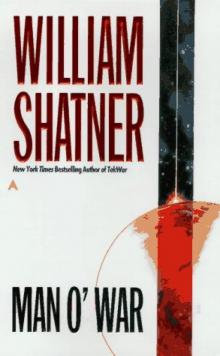 Man O' War
Man O' War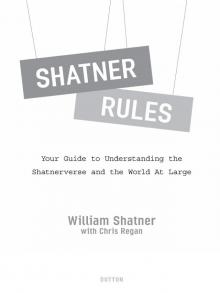 Shatner Rules
Shatner Rules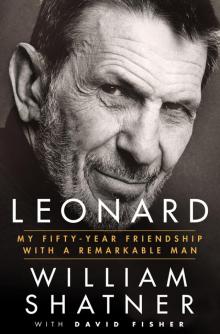 Leonard
Leonard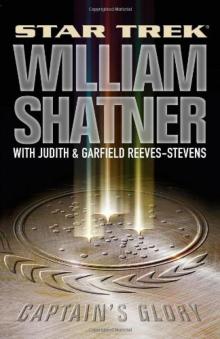 Captain's Glory
Captain's Glory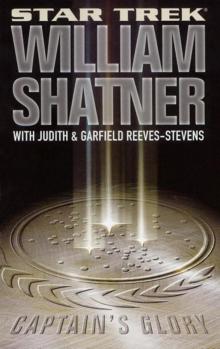 Captain's Glory зпвш-9
Captain's Glory зпвш-9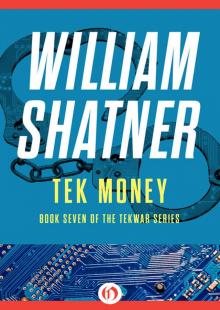 Tek Money
Tek Money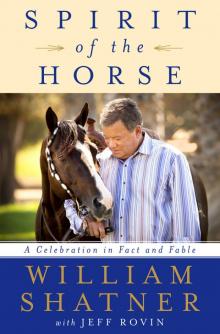 Spirit of the Horse
Spirit of the Horse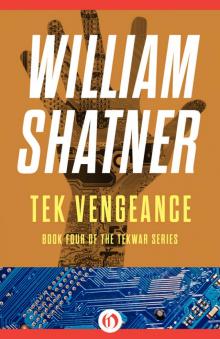 Tek Vengeance
Tek Vengeance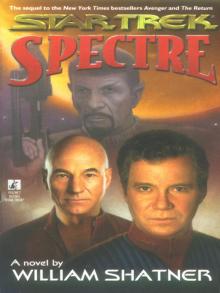 Spectre
Spectre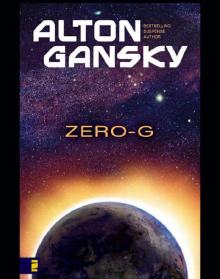 Zero-G
Zero-G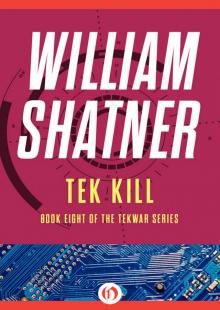 Tek Kill
Tek Kill Collision Course
Collision Course TekLab
TekLab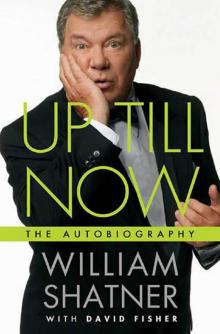 Up Till Now
Up Till Now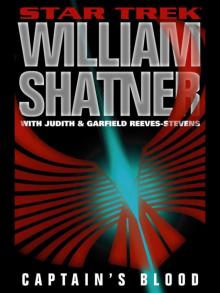 Captain's Blood
Captain's Blood TekWar
TekWar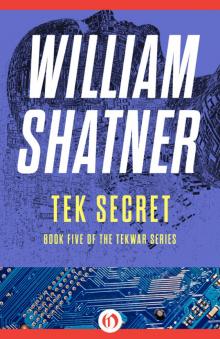 Tek Secret
Tek Secret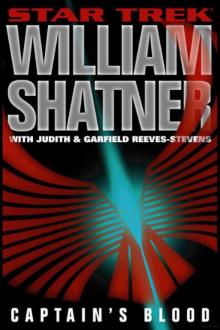 Captain's Blood зпвш-8
Captain's Blood зпвш-8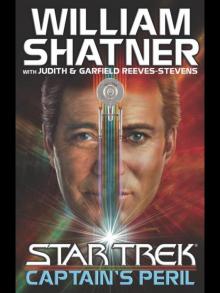 Captain's Peril
Captain's Peril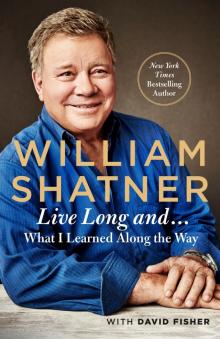 Live Long and . . .
Live Long and . . .